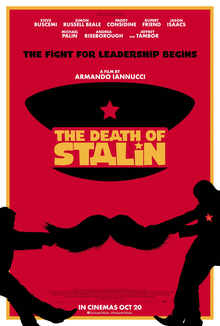
Since we’ve both watched and loved Armando Iannucci’s In the Loop, seeing this was inevitable and we already know what we’re in for. It’s a little strange to see all those British actors with their accents playing supposedly Russian characters while Steve Buscemi plays Nikita Khrushchev but it’s easy enough to grasp who’s who especially with the convenient title cards when each character is introduced.
After Joseph Stalin forces an orchestra to repeat a performance of a concerto in order to have it recorded for his personal use, pianist Maria Yudina adds in a note insulting the dictator. When he reads it later that evening, he laughs and then is struck by a stroke. When the housekeeper discovers him the next morning, the members of the Central Committee quickly rush there. They discuss bringing a doctor to tend to Stalin but realize that they have already executed all of the competent ones. Even before Stalin is declared dead, Interior Ministry head Lavrentiy Beria takes measures to seize control by securing blackmail material and positioning his NKVD units to replace army ones. Khrushchev is the only one who tries to stymie Beria but is outmaneuvered at every turn, especially with Deputy General Secretary Georgy Malenkov being named nominal Premier and acting as Beria’s puppet. However when NKVD guards kill civilians trying to enter Moscow for Stalin’s funeral, Khrushchev finds a powerful ally in war hero Georgy Zhukov.
To be fair, this film isn’t very historically accurate. For example, Beria was actually arrested three months after the death of Stalin. The film was adapted from a French graphic novel of the same name rather than any reliable source and the intent is clearly to bring together all of the most well known figures of the era to create a more compelling drama. After all, part of the fun here is watching Khrushchev and his wife working on a list of what Stalin finds funny in order to avoid saying things that offend the dictator or Zhukov strutting into the ballroom with his torso entirely covered with medals. Still, accurate or not, I think it nicely captures the spirit of the sudden change of regime with all of its absurdities and farcical happenings. As Iannucci states, it’s rather ridiculous how there are so many films mocking Hitler but so few ones mocking Stalin who continues to be revered by many in Russia.
Another question that arises is whether or not this film is funny. Certainly some bits are hilarious such as the radio director’s attempts to call in random people from the street to recreate a live audience for the repeat performance of the concerto or Khrushchev and Molotov being confused over their own double-think as they discuss the case of Molotov’s wife who was charged with treason. But for the most part, it’s hard to laugh at this film because watching Stalin’s death squads imprison and execute thousands people is no laughing matter, nor is Beria’s casual use of torture and rape. A big part of what made In the Loop so funny was that all of the politicians’ jostling for position amounted to nothing because the UK is a second rate power with no ability no influence US decisions anyway. In this film, the stakes involved when it comes to whether Khrushchev or Beria ends up winning the contest to succeed Stalin is very high and very real indeed. This makes it less of a comedy and more of a serious political thriller.
As I wasn’t familiar with these events surrounding the death of Stalin, I found this to be an educational film indeed even if its account is fictionalized. I also find Iannucci’s aims in making this film laudable and it’s certainly creative and unconventional to depict Stalin’s death in this manner. However as a work of art, I think it’s inferior to In the Loop since the subject matter matched the style and humor so perfectly in the earlier film and that can’t be replicated here.